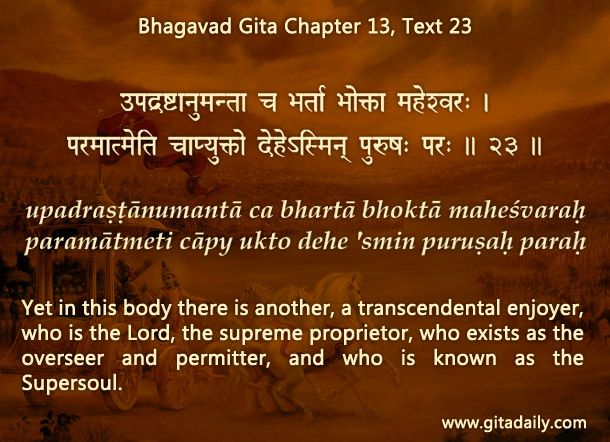Supervision refers normally to overseeing, but it can also refer to a vision that sees far beyond the ordinary, just as the word superman refers to a man with superhuman abilities.
Both these senses of the word supervision can be applied to Krishna’s mode of interaction with this world. The Bhagavad-gita (09.10) states that material nature works according to its laws under Krishna’s supervision. Modern science aims to discover the laws by which nature works – Gita wisdom takes our discovering spirit beyond such laws to the one under whose vigilant vision those laws work. The Gita (13.23) uses explicitly the word overseer (upadrashta) and permitter (anumanta) to describe how the Supreme interacts with the world. Though Krishna is not directly involved in the actions of the material energy, still its actions depend on his sanction.
When we are not philosophically well-educated, we are often unable to perceive Krishna’s actions in this world. So, we may doubt whether he is aware of what’s happening when things go wrong in our lives.
The Gita (13.14) assures that Krishna has his eyes everywhere, pointing thus to his super-vision. With his super-vision, or to put it in more familiar theological terms, with his omniscience, he knows and he cares.
When things start going out of control and we start becoming panicky, we can remember that Krishna is always in control. Not only is he the supervisor of material nature, meaning that not a blade of grass can move without his sanction but also that his benevolent super-vision is watching us, envisioning and ensuring that everything will work out eventually for our ultimate good. All we need to do is to do what Arjuna did on hearing the Gita (18.73): do Krishna’s will with determination, thus doing our part – and he will by his perfect plan do his part.
To know more about this verse, please click on the image
Explanation of article:
Podcast:


Thank you Prabhuji for great explaination, I read your post everyday
Hare Krishna!
Thank you – happy to be of service.
ys
ccdas
Hare Krishna Prji,
Your articles helps me advance in Krishna Consciousness.Thank You very much.